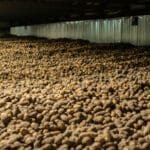[deck]Organic soil amendment products are showing promising results in the fight against soil-borne pathogens. Will they offer growers a viable alternative to crop protection products?[/deck]
Fertile soil is one of the most important elements of successful crop production. Arable farmers have used soil amendments to enhance soil properties for centuries, and soil specialists around the world agree that soil organic matter is a crucial determinant of plant health. An increase in the soil’s organic matter content vastly improves the soil’s ability to retain nutrients and make them available to plants, with the added benefits of improved soil buffering capacity and biological diversity.
A soil amendment is the addition of material to a soil to improve its physical properties, such as water retention, permeability, water infiltration, drainage, aeration and structure. Farmers use soil amendments to provide a better environment for plant roots to develop to their optimum potential.
Soil amendments fall under two broad categories—organic and inorganic. Organic amendments are composed of materials that are or were alive, such as peat, woodchips, grass clippings, straw, compost, manure, bio-solids, sawdust and wood ash. Inorganic amendments, on the other hand, are composed of materials that are either mined or man-made, such as vermiculite, perlite, tire chunks, pea gravel and sand.
Positive Impacts?
In the paper entitled Enhancing Biological Control of Soil-Borne Plant Diseases by Organic Soil Amendments, scientists Pervaiz Abbasi, George Lazarovits and Kenneth Conn of Agriculture and Agri-Food Canada in Ontario state that organic amendments have been used in sustainable agriculture primarily as bio-fertilizers and soil conditioners. Such amendments provide nutrients to crops, and alter the biological, chemical and physical properties of soil.
It is well known that organic matter has been severely depleted in many agricultural soils due to intensive cultivation over the years. According to Abbasi, this has resulted in soil structure degradation. “Organic amendments can play an important role in revitalizing such soils by increasing their organic matter content,” he says.
Abbasi also points out that many of the soils that potatoes are grown in would benefit from application of additional organic matter. “There is compelling evidence that organic amendments help to maintain the abundance and diversity of soil microbial communities,” he states. “They are useful for building high populations of resident beneficial organisms while decreasing populations or activities of plant pathogens and nematode pests.”
Although chemical pest control products have become the primary means of controlling many pathogens and pests, attention has recently turned to the effect organic soil amendments have on soil-borne plant diseases and pests, given the increase in concerns about agrochemicals on the environment and human health.
According to Abbasi, disease suppression occurs through a number of mechanisms, including biological control and generation of breakdown products that are toxic to pathogens and pests. “Some amendments may also induce resistance in plants,” he states.
The study further suggests that changes in overall soil microbiology can lead to biological control of soil-borne plant pathogens. The decomposition of organic amendments can result in the generation of specific compounds in the soil that kill plant pathogens and nematode pests.
Amendment Options
The use of organic soil amendments such as animal manures and composts is a common practice on both organic and commercial operations. Fresh or composted organic material such as animal, poultry and fish byproducts, plant-based products, manures, and composts have been been effective in suppressing soil-borne plant diseases when used as soil amendments. Though results have been inconsistent between fields, it is established that soil-borne plant diseases are less severe in organically-managed soils than in conventionally-managed soils.
A wide variety of organic amendments have been tested for their effects on potato diseases and plant-parasitic nematodes. Conn, Abbasi, Lazarovits and Mario Tenuta at the Southern Crop Protection and Food Research Centre have grouped them according to their sources or general types in their paper entitled Using Organic Soil Amendments to Control Soil-Borne Potato Pathogens and Nematode Pests. The authors also discuss the latest research findings on animal manures, animal byproducts, chitinous wastes, plant-based products and composts.
Animal manures
The potato disease that has received the most attention with respect to the effect of manure on its occurrence is common scab, caused by the bacterial pathogen Streptomyces scabies. Scientific reports of the effects of animal manure on common scab are mixed, ranging from an increase in scab incidence, to a slight, and in some cases a significant, reduction.
The effect of animal manures on potato diseases and parasitic nematodes is not only variable, but also depends on the type of manure used, the field the manure is applied to, and likely many other parameters not yet identified. Inconsistency in efficacy and inability to predict the impact of animal manures on disease have limited widespread exploitation of animal manures for disease control.
Animal Byproducts
Meat and bone meal is a waste product from the rendering industry that is high in nitrogen content (7.7 per cent total nitrogen). The addition of MBM at 37 tonnes per hectare to two potato fields in Ontario reduced the severity of verticillium wilt and common scab and decreased the incidence of plant-parasitic nematodes to near zero levels at both locations in the year of application. At both sites, scab severity returned to control levels in the second year and its severity increased up to twofold when compared with the control treatments in the third year. The high rate of MBM also caused phytotoxicity in the year of application, which resulted in reduction of tuber yield.
Fish emulsions, or fish soluble nutrients, are liquid byproducts of the processing of fish into fish meal. Abbasi and colleagues have demonstrated that the addition of fish emulsion (20 hectolitres per hectare) to the soil from nine potato fields significantly reduced common scab by 50 to 90 per cent in seven of the soils, when compared with the uninoculated control treatments. Verticillium wilt was significantly reduced in one soil only, when compared with the control. Fish solid waste has also been known to reduce the populations of plant-parasitic nematodes.
Chitinous Wastes
Chitinous wastes are generated from the shells of crustaceans such as crab, shrimp and lobster, and have been one of the most extensively studied soil amendments to control plant-parasitic nematodes.
Commercial chitin products include Clandosan, made from crab shells and agricultural-grade urea, and Eco Poly 21 Micro-Shrimp Fertilizer, which is produced for nematode control. Rick Peters, a research scientist for Agriculture and Agri-Food Canada, and his colleagues have shown that the addition of raw lobster waste as an in-furrow soil treatment significantly reduced potato diseases caused by Rhizoctonia solani.
Plant-Based products
Soymeal is the material remaining after the removal of oil from soybeans, and is high in nitrogen content (7.3 per cent total N). Work done by Lazarovits and colleagues has shown that the addition of soy meal at 37 t/ha to potato fields in Ontario reduced the severity of verticillium wilt and common scab, as well as the incidence of plant-parasitic nematodes to almost zero at both locations in the year of application.
Researchers have also examined the effects of ammonium lignosulfonate, a by-product of paper manufacturing, as a pre-plant soil amendment on common scab and verticillium wilt in four commercial potato fields in Ontario (six-tonne solids per hectare). They found that a single application of ammonium lignosulfonate reduced the incidence of verticillium wilt (40 to 50 per cent) and scab (50 to 80 per cent) compared with the control treatments in all locations in the year of application. Additionally, in some locations, disease severity remained lower than control levels in subsequent years when potatoes were re-planted into the same soils without further addition of ammonium lignosulfonate.
Composts
Although composts have been used as soil amendments by farmers for centuries to enhance soil fertility, some composts are also known to have a positive influence on curbing plant diseases caused by soil-borne pathogens. In a greenhouse study, potato plants produced in soils amended with vegetable compost and woodchip polyacrylamide cores showed significantly lower infection rates of Verticillium dahliae when compared with the control and manure and vegetable composts alone.
TerraBioGen Technologies Inc., a Canadian biotech company, has refined its patented aerobic digestion process for the conversion of organic waste materials into agricultural products with plant growth promotion and disease suppression characteristics. Over the past year, TerraBioGen has worked with A&L Biologicals on validating the performance of its products through field trials conducted on tomatoes and potatoes in Ontario.
According to Blair Heffelfinger, president and CEO of TerraBioGen, “In addition to increased growth response and improved plant health, the TerraBioGen products outperformed the controls and competitive products, and showed up to a 35 per cent yield increase in tomatoes and a 29 per cent yield increase in potatoes over the grower standard.” The company is planning to scale to commercial production later this year.
“The use of organic amendment for managing soil-borne diseases and enhancing soil fertility will continue to expand as an alternative to agrochemicals, especially in organic production systems,” concluded Abbasi in his report. “There is indeed a great need for potato growers to focus on soil management practices that improve soil quality and health.”











